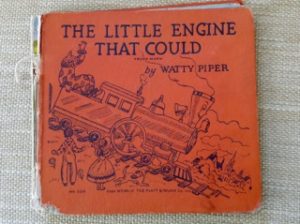As the new Afghan refugees arrive, this 2017 story seemed worth repeating
I own a stripped-spine copy of The Little Engine That Could. I’m not sure how I came by it, but with its soiled cloth cover rubbed bare at the corners, it could be the very book I had as a child. I read it in my grandparents’ house in Queens, where I lived when I was six. It was a fine book for learning how to read, with all those good little boys and girls on the other side of the mountain being repeated every time the funny little clown asks the next engine who comes along for help.
It’s also inspirational. Those for whom the task would have been easy decline; an old engine sighs, “I cannot, I cannot.” Finally the Little Blue Engine offers, “I think I can—I think I can,” saying it many more times than twice.
It was my favorite book. I must have loved the repetition. Maybe the message too. That someone little could climb mountains. (Someone little and female, though I don’t remember paying attention to gender.) That good children would get their food and toys because the Little Blue Engine practiced positive thinking.
When 45 was elected, I resolved to Do Something. I called congress, sent postcards to voters, did the Women’s March. But marching in the streets is a young person’s game. I resolved to volunteer in an area 45’s destructive administration threatened: our precious national parks, the environment, health insurance. I’m a teacher, went with my skillset, became an in-home tutor for a refugee learning English.
F— was 25, had only been married a few months when her husband M—’s application was approved and he came here. She joined him months later, pregnant, when he had a tiny apartment and night shift maintenance job. She took English classes until the baby came. When we met, she’d been here nine months and the baby was three months old. “She is lucky,” M— said, holding his daughter, “she’s an American citizen.”
F— confused dimes and nickels, kept thinking the larger coin should be worth more. She mixed up question words: where and when and why. We worked on those things and the basic grammar and speaking lessons the program gave us. She caught on quickly, did her homework.
Their four-story apartment building was in the middle of a row of four-story apartment buildings. In the minute foyer I was supposed to buzz them, but there was usually a stone holding the inside door open. I climbed narrow stairs, a smell of cooking oil in the hall, the sound of several languages coming through nearby doors, a baby crying. Taking off my shoes, I learned to say, “Salaam aalaik,” which made them smile. They responded, “Aalaik Salaam.” Peace be with you. And with you also.
At first F— was timid, but in a month she said, confidently, “How are you? Come in.” The tea set she brought with her from Afghanistan was always on the table—usually with a plate of muffins she’d made. In deference to me, we sat on the couch. Once I arrived as they were finishing a meal, a quilted cloth spread over the carpet by the floor cushions, their dishes arranged on it. I imagine it keeps the hips and knees flexible if you do that all your life. Alas. Too late for mine.
I felt F— tiring of the book exercises after a while. When I taught Spanish, I collected children’s books in Spanish and my high school classes read them every week. “Oh, Sra. Dubrava, it’s Good Night Moon!” a girl would exclaim, hugging the book to her chest. Buenas Noches Luna. Books we loved when small evoke misty memories, even at sixteen.
The next class I brought The Hungry Caterpillar. F— was delighted, could read it to me almost fluently. There were only five new words. “Lollipop” was one. I brought her a lollipop next time, a large round red and white one like the illustration. She added the new words to her vocabulary list, writing the elegant Dari-Persian translations after them.
For one class, the baby was fussy. We spent most of our time taking turns holding her. Another was cancelled. A week later, F— was excited. “I go shopping,” she said, and I made a note to work on past tenses. She pulled a shiny new book out of a plastic bag. The Little Engine That Could. I hugged it to my chest. I read it to her. She read it to me. When she came to, “I think I can,” she laughed over the repetition and said, “I think I can learn English.”
Afterword: After taking classes, M— obtained employment as a draftsman in an architectural firm. F— advanced from ESL classes to community college. They moved to a newer, bigger apartment, F— learned to drive, completed a childcare course and now works in an early education daycare center. In 2021, F— and her husband both earned U.S. citizenship.


A good story to read along with a Stevie Wonder song.
Beautiful, Pat! Thanks for sharing this bright note again. A week or so ago I read “The Hungry Caterpillar” to grand-daughter Willow. And “Goodnight Moon,” oh my—still one of my favorites.